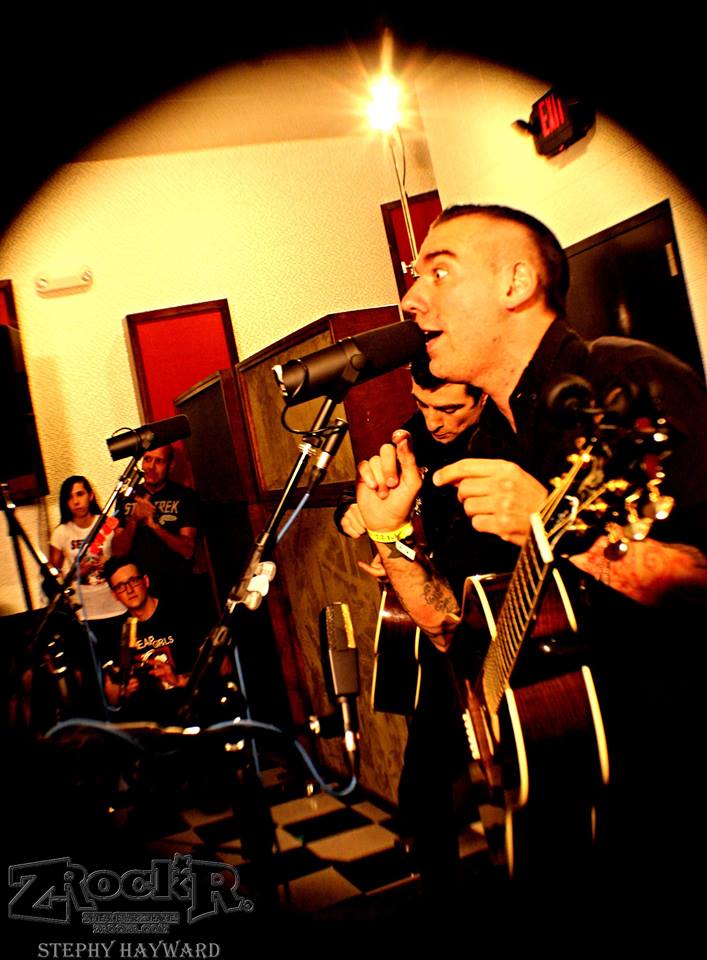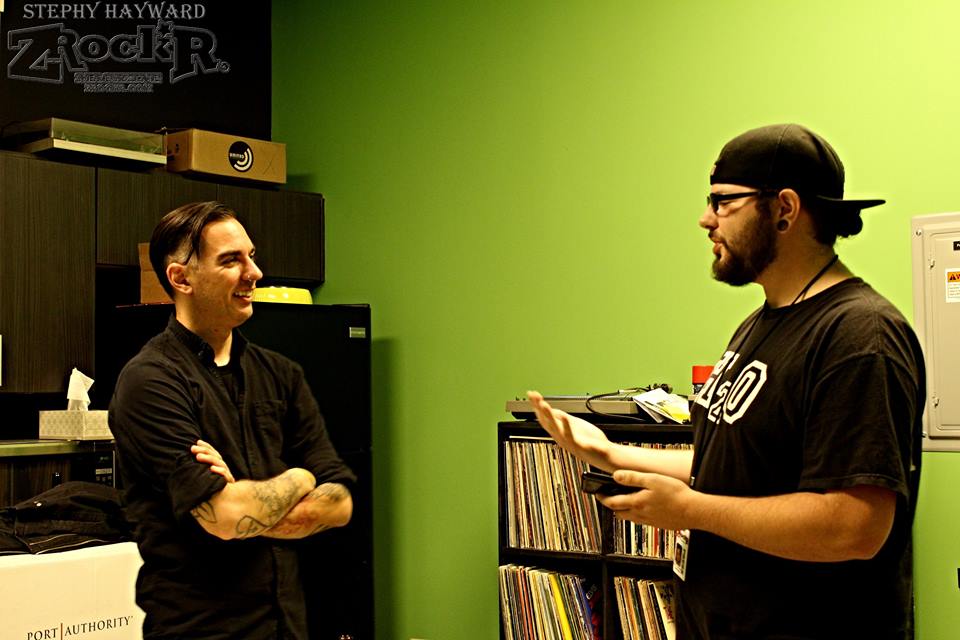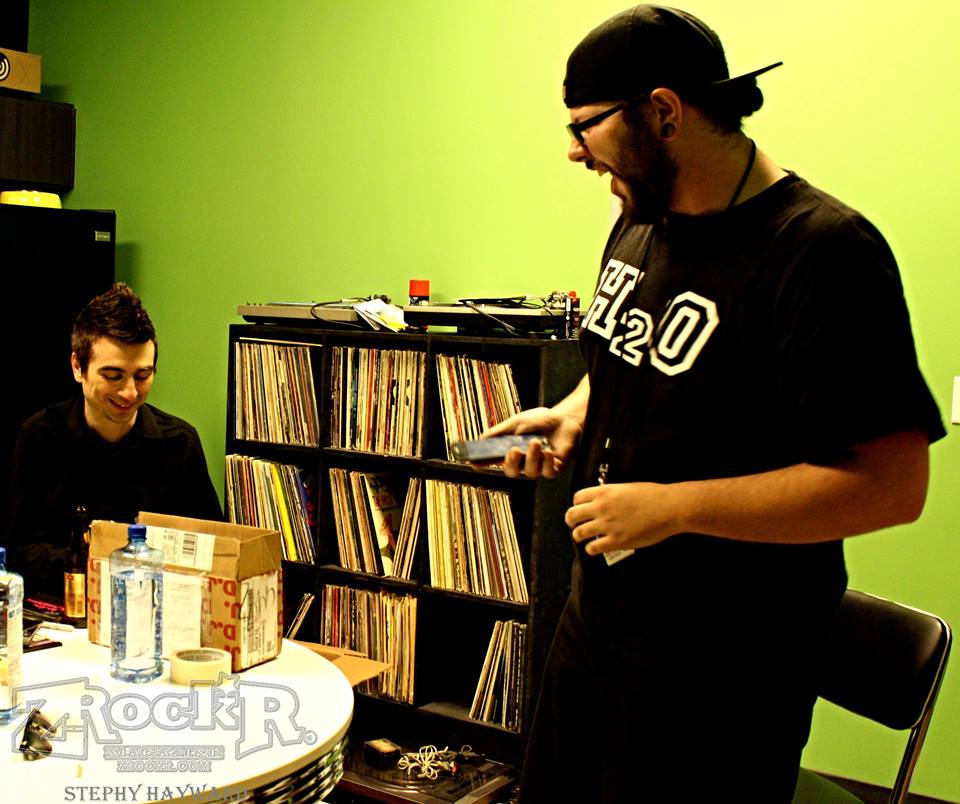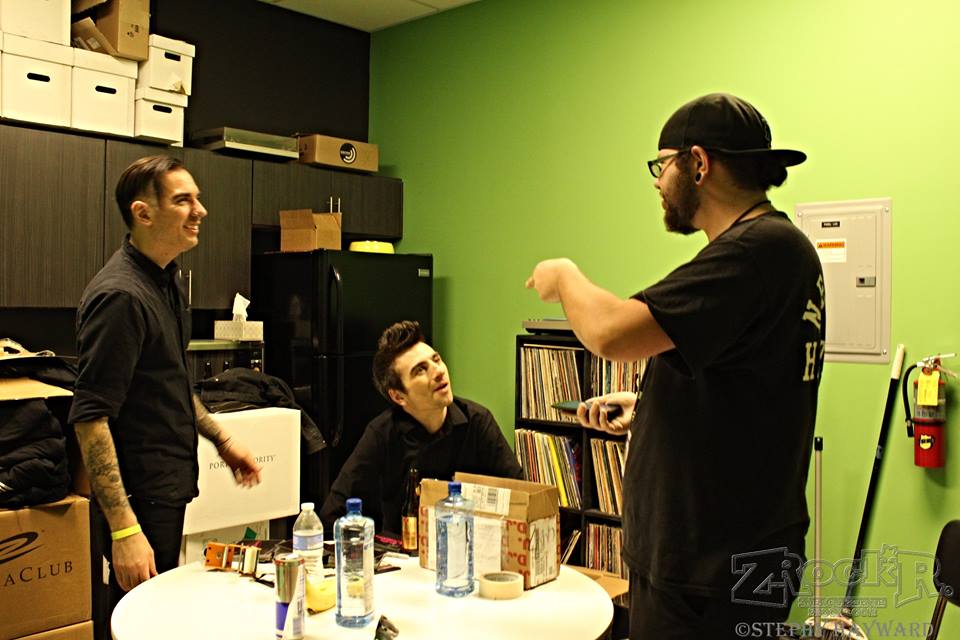Since the mid-nineties, political punk rock band Anti-Flag have released numerous hard-hitting albums about equality and truth, and here in 2015 they have done it again with American Spring. Zrock’R was able to catch up with Chris #2 and Justin Sane of the group to pick their brains about the album after an intimate acoustic performance at 11th Street Records during the first night of Punk Rock Bowling in Las Vegas. We started off with Chris #2 while Justin was outside signing autographs and mingling with fans…

ZR: First, I need to say thank you for what your band has done for me. Growing up in the new millennium, it was hard not to get caught up in the military or post-911 fears. Anti-Flag has taught me so much and showed me that there is a group of people that feel the same way as I do.
Chris #2: For us to be a part of that process is really humbling. I felt the same way when I would go see Bad Religion or whenever I found a Dead Kennedys record. So, I think that’s kind of the same amount of empathy that we’re trying to share with the songs that we write in 2015.
There was a woman up front who was like 15 and clearly dyed her hair purple in her mom’s sink before she got here, and that moment of opening her to be free to be herself; that’s what this is about. Having solace for heavy moments is what punk rock should be.
ZR: So, we were listening to American Spring on the way over here, and I noticed that you sound a lot more angry on the album. I heard you speak on the Ferguson Riots and that really got to you…
Chris #2: Yeah, kind of going backwards to what we were talking about; the key word that I’ve been using is empathy. I feel like punk rock exists as a vehicle for us to share ideas, but also know that there are people who feel the way we do.
So, when the events in Ferguson happened and there was no indictment for Darren Wilson, the killer of Michael Brown, I immediately referenced my own life and had such empathy for the Brown family because I lost my sister from violent crime. Her murder was a scarring event in my life to say the least, but another heavy part of it was how mishandled the litigation was, and how I was shown directly how American Justice cares so little for people who are poor. So I immediately went to that head-space.
Part of it had to do with how emotional I was overall. I had a relationship end, I had a lot of things happening to me that kind of, you know, just on a human level when you’re sad, things hit you heavier than they normally do. It definitely went into the writing of the record, and being asked to write songs in that head-space is a difficult task, but I thought it was important to use it for that very same reason, because I know there are people that feel like me, that feel the same way when they see these things, that have had relatives that they lost or loved ones that they miss that they want in their lives but no longer have in their lives.
So, I knew that the empathy of punk rock would tie into them, and that’s really why I forced myself to be a part of it. Then, whenever it comes to Justin, Pat, and Chris Head, they were there to pick me up whenever I was really down, and I felt that was important to return the favor and be focused and diligent in the writing process.

ZR: I thought it was really cool that you gave an ode to Joe Hill during the performance, especially in a time where we are fighting for minimum wage and should look back in history at the fight we’ve had for our labor laws. What kind of influence did Joe Hill have on the song? It was “1915” off of The General Strike, right?
Chris #2: Yeah, 1915 is the year of Joe Hill’s death. The song is about the fact that in his will and testament he wanted to be cremated and have his ashes sent around to various people.
The International Workers of the World sent his ashes to the C.I.A, and it said, “Joe Hill murdered by the capitalist” on the letter that they sent, and when they opened it up it was Joe Hill’s ashes that fell on the table. Then there was Billy Bragg, who poured some of Joe Hill’s ashes in a glass and drank it.
The other thing that I think is amazing about Joe Hill, is that he was aware of the martyrdom that he would create by being killed by firing squad. Even though he could have litigated further and probably showed he was innocent, he was accused of murder, his trial was very swift; not a trial of his peers but a trial of bureaucrats. That being said, when he went to firing squad, they said “What are your last words” and he said “Fire”. That’s bad ass!
ZR: My favorite quote from him is, “Don’t waste time mourning, organize.” That just sits in you.
Chris #2: Yeah, and that was again him reiterating to the world that this will be a divisive moment, and when they killed him that really was a shot in the arm to the labor movement to continue working. He was then revered as a hero and that changed the landscape of a lot of things.
ZR: I read an article with you guys talking about the election, being the vote of the lesser of two evils, but what are your thoughts on Bernie Sanders?
Chris #2: I think it’s cool. My knowledge of Bernie Sanders is not that vast, so just from what I’ve seen he sounds like a man of the people, and that’s what I want in a president.
The same goes to Elizibeth Warren, she’s had a lot of great things to say. I don’t know if she’ll run, but I think that having people like that in elected office is really important, and hopefully is going to balance some things out.
I think that one of things that we’re trying to stay focused on is to not give free passes to people that just say the right thing, but people who actually deliver. I don’t know what it would look like to have a more direct democracy; to have this ability to have politicians working in the interest of votes and less than campaign fiance dollars or lobbyist, but I do know that both Elizabeth Warren and Bernie Sanders have talked about severe campaign finance reform, and those are ideas that really excite me. That’s the kind of stuff that I want to get behind.
I think there needs to be a paradigm shift in the politics of America or else we’re going to have Bush, then the Obama daughter’s going to be old enough to run…
ZR: Wow, I didn’t think about that. We can have the same three family presidents for a while.
Chris #2: Yeah, it’s a dynasty.
ZR: I really enjoyed the song “Brandenburg Gate” off of the new album with Tim Armstrong. I know you guys have played shows with Rancid multiple times, but who was more excited to work with who on the song?
Chris #2: It’s funny because we played it so cool, Tim Armstrong is in the studio and we’re like, “Oh yeah. Whats up, man” and would give him a high five. Then he would do a take and me and Justin would be like, “Oh my god, he did it! He sang on it!”
So, it was definitely a lot of us feeling like we were so excited that Tim was in the room. I don’t know how much he gave a shit about us, so we were the more excited party, for sure.
There’s a lyric “She was searching for salvation in the things you buy.” and I just wanted to hear Tim Armstrong sing the word “salvation”, and that was really exciting to me. Also, I printed out the lyrics and did a bunch of shit for him, and he didn’t want it. He hand wrote the lyrics and I spent the time trying to steal it, but he left with it. I wanted to steal Tim Armstrong’s lyrics.
ZR: I heard you say that Tom Morello worked on the album with you guys too?
Chris #2: So, Tom played a guitar solo on the song “Without End”, and Tom and ours relationship is very tight. We met in 99′, we did the Battle of Los Angles Tour with Rage Against the Machine, and we’ve stayed really good friends through that process.
So, the Tim Armstrong side is us coddling to Tim like, “What do you need from us? What do you want?”, and then the Tom Morello thing is like “Yo, this song ‘Without End’ wouldn’t exist if we didn’t meet you, you have to find play on it.” and he’s like, “I’m busy!”, and I’m like, “I’m gonna sleep on your porch until you do!”, and then he just did it.
So, our relationships between Tim and Tom are very different. We kinda go way back with Tom, where as Tim, it’s still like we only know each other from passing, you don’t want to offend anybody, and you want to be gracious and cool. Where Tom will call me up and say, “Hey! I’m working on a new Nightwatchmen album!”, I’m like “Great, you’re in the studio! Play guitar!”
ZR: That’s awesome because I’ve never seen much collaboration in your albums before.
Chris #2: To be honest I wanted more. Like, I had a lot of people that were in the wings to do stuff, like Ian from Billy Talent and Tim from Rise Against, but they were on tour and traveling so it became hard.
I wanted a fucking a hip-hop record of features; I love that shit, but I think I’ll settle for Tim Armstrong and Tom Morello. I think we did okay.
ZR: You most definitely did! If you could record with anyone, alive or dead, who would it be?
Chris #2: I’d love to make a record with Rick Ruben, that would be amazing. He offered to sign our band in 2004, and that’s when we ended up on RCA. It was kind of what was the best deal for the band, that’s what decided it, but there’s not a day that goes by that I’m like, “Man, what would have happened with Rick Ruben!”
Justin then made it in the room, and after expressing the same appreciation I did to Chris, we continued.

ZR: I remember you guys played before Rage Against the Machine at the 2008 protest on Wall Street, when the cops pulled the chord on Rage and they still played the set…
Chris #2: Yeah with MY bullhorn! That’s my bullhorn! My bullhorn never gets credit!
ZR: Oh, it’s getting it now! So how was the atmosphere there?
Chris #2: It was so funny, because we came on after Michael Franti, and Michael Franti has no shoes on, he’s being a hippie, and everyone’s dancing. Then the radio mentions that Rage was coming and the audience completely turned, and all of the sudden it became a rock audience.
Then we went up and were like “Fuck police brutality!” and people were like “Hell yeah!” Then Rage Against the Machine came and we’re still playing, and people are like, “Rage is over there! They’re in a car!”.
It was so funny to see everything. It was swirling, people knew something was coming. Then of course there was them pulling the plug and saying they were gonna shut everything down if Rage played, which they had a permit, they had everything.
Justin Sane: They were just being bullies, and that’s what they are.
ZR: The message you guys spread at shows is amazing. I remember hearing Mobilize for the first time as a teenager, and during the live recordings Justin would speak on political issues, and they leave such an impact.
Chris #2: Yeah, I think for us it’s almost self serving on some level to know that there’s people that feel the same way that we do. A lot of the time there’s a moment when you say we’re proud supporters of a community that stands against racism, sexism, homophobia, bigotry, and when people clap back at you for that you realize, I’m not alone; not everyone watches Fox News, not everyone lives in Des Moines, Iowa. It’s definitely a moment of solace, and that’s the purpose of the shows.
ZR: Speaking of news organizations like Fox, modern media reminds me of “Underground Network”, when we say we want to distribute our ideas and our news, and the internet has given us that avenue. We’ve been able to use that to communicate with people that have like minds and make a difference through means that aren’t normal, like a newspaper. Now we have organizations like Vice that are the opposite of Fox News; showing fair, factual views from both sides. Where do you see that type of media going in the future?
Justin Sane: I think it’s great because it’s democratizing ideas, it’s literally like democratizing the news. Even doing what you’re doing, it gives everyone a chance to get out there and do their research, then put it up and let everyone decide for themselves.
I think once you give people a choice, they’re able to investigate on their own and they can make up their minds. I think ultimately people come down on the side of justice, and fairness, and equality; and that’s exciting to me.
Chris #2: We made a record called American Spring that was obviously referencing the Arab Spring, and this idea of a youth movement happening in parts of the world where they said revolution was never possible. They used Facebook and Twitter to connect people as rallying points, saying “We’re meeting at Tahrir Square tomorrow at noon”.
Then the other side of it is, they often reference this in the right, saying “Through social media, if China was able to see how good America was they would want democracy”, but there is some truth to the fact that people were able to see social media, and see other things that were happening like the Occupy Wall Street movement, and that then inspired another wave a protest that was then inspiring another wave of protest.
So, there is some leveling of the playing field that happens through social media, and I think that it’s not one that should be overlooked or just seen as people showing pictures of their cats; there’s some real power in there and they should harness it.

ZR: I always like to stress that message. We hold something powerful now the internet, but we use it for sharing cat pictures instead of saying something meaningful.
Chris #2: Well, I think there can be room for both.
Justin Sane: Absolutely, because I’ve had cats and I fucking love cat photos, and there should be room for both. There should be things that bring joy to people’s lives or celebrate the things that they love.
It’s also important to put ideas for change out there too, so we can change the world for the better and have those moments of happiness.
You can watch Anti-Flag’s full acoustic performance from 11 Street Records below, and be sure to pick up American Spring, which is out now!
All interview photos ©Stephy Hayward / ZRock’R Magazine

